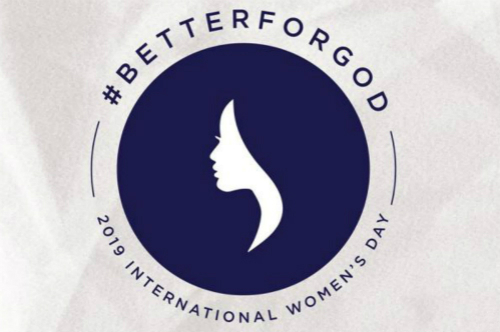
Message from Ms. Audrey Azoulay, Director-General of UNESCO, on the Occasion of International Women’s Day文章源自英文巴士-https://www.en84.com/6749.html
教科文组织总干事奥德蕾·阿祖莱女士国际妇女节致辞文章源自英文巴士-https://www.en84.com/6749.html
文章源自英文巴士-https://www.en84.com/6749.html
“Women in the Digital Space”文章源自英文巴士-https://www.en84.com/6749.html
“妇女与数字空间”文章源自英文巴士-https://www.en84.com/6749.html
文章源自英文巴士-https://www.en84.com/6749.html
8 March 2019文章源自英文巴士-https://www.en84.com/6749.html
2019年3月8日文章源自英文巴士-https://www.en84.com/6749.html
文章源自英文巴士-https://www.en84.com/6749.html
This year’s International Women’s Day, we celebrate women’s contributions to society – particularly in the digital space – and reflect on how we can ensure women fully enjoy their rights.文章源自英文巴士-https://www.en84.com/6749.html
今年的国际妇女节,我们颂扬妇女对社会、特别是对数字空间的贡献,也思考如何确保妇女充分享有其各项权利。
Digital technologies are affecting the ways in which we work, learn, teach and live together. Unfortunately, women are not necessarily fully benefiting from this technological revolution. A recent report by the Broadband Commission, co-authored by UNESCO, concluded that the gender digital divide is actually increasing: in 2016, there were over 250 million fewer women online than men that year. Women are not only less connected, but benefit less from digital literacy and skills training, are less likely to be hired by tech companies, and often earn less than their male colleagues.
数字技术影响着我们工作、学习、教学和共处的方式。但遗憾的是,妇女并不一定能从这场技术革命中充分受益。最近,宽带委员会与教科文组织共同编写的一份报告认为,性别数字鸿沟实际上正在加深:2016年,上网的女性比男性少2.5亿多人。女性不仅网络联通性较低,而且从数字素养和技能培训中获益也少,受技术公司聘用的可能性小,收入往往也低于男性同事。
Even within some of the most cutting-edge fields of science – digital technologies and artificial intelligence – women are at a disadvantage. Only 22 per cent of artificial intelligence professionals are female, for example. This year, UNESCO seeks to redress the balance as we celebrate pioneering women who have pushed back the boundaries of our knowledge in fields such as quantum computing, digital innovation and artificial intelligence. By highlighting the successes of these women, we hope to encourage a new generation of young women in science, technology, engineering and mathematics (STEM) fields, where they remain under-represented. We work to encourage girls and women to take up STEM fields, and particularly to develop digital skills, for example through the recently launched “Girls Can Code” project.
即使在数字技术和人工智能等一些最前沿的科学领域,妇女也处于不利地位。例如,人工智能从业人员当中,女性仅占22%。今年,在颂扬不断开拓量子计算、数字创新和人工智能等知识领域的女性先锋的同时,教科文组织也力求解决性别平衡问题。通过强调这些女性取得的成就,我们希望鼓励新一代青年女性投身于女性比例仍然较低的科学、技术、工程和数学(STEM)领域。我们大力鼓励女童和妇女从事科学、技术、工程和数学领域的工作,特别是通过最近推出的“女孩能编程”等项目,培养数字技能。
In the cultural field, we also support women’s access to digital creation and we are promoting gender equality in the creative industries through the “You Are Next” initiative. In partnership with Sabrina Ho, UNESCO is equipping hundreds of young women from Mexico, Palestine, Senegal, Afghanistan and Tajikistan with the artistic, digital and entrepreneurial skills needed to succeed in the digital environment.
在文化领域,我们也支持女性参与数字创作,通过“你也来参与”倡议促进创意产业的性别平等。教科文组织与何超盈合作,为墨西哥、巴勒斯坦、塞内加尔、阿富汗和塔吉克斯坦的成百上千名女性提供在数字环境中取得成就所需的艺术、数字和创业技能。
Despite such initiatives and many female role models in the digital sphere, women are increasingly removing themselves from online platforms to protect themselves from cyber-attacks and harassment. One in 10 women in the European Union report having experienced cyber-harassment since the age of 15, particularly among young women between 18 and 29 years of age. UNESCO – as a United Nations agency dedicated to information and communication – is at the forefront of the fight against gender discrimination, deconstructing the stereotypes that spread through the media, as well as fighting harassment online.
尽管采取了此类举措,尽管数字领域也出现了许多女性榜样,但现在越来越多的女性为了免遭网络攻击和骚扰而退出网上平台。在欧洲联盟15岁以上的女性人群中,称自己遭受过网上骚扰的女性达十分之一,这一问题在18至29岁的年轻女性当中尤为严重。教科文组织作为专门负责信息和传播的联合国机构,处在反性别歧视的第一线,要破除通过媒体散布的陈规定见,并与网上骚扰作斗争。
To contribute to tackling stereotypes, I invite you to join the global #Wiki4Women contributory movement. On Wikipedia pages only one biography out of six is currently devoted to a woman. By creating or completing biographies on extraordinary women in culture, education and the sciences on Wikipedia, UNESCO aims to give them the digital existence they deserve. Building on last year’s successful “edit-a-thon” at UNESCO Headquarters, UNESCO is once again collaborating with the Wikimedia Foundation, in organizing “edit a-thon” workshops in Cairo, Delhi, Bangkok, Lima and Almaty, as well as Paris.
为了促进消除陈规定见,我谨邀请大家参与全球性的“维基助力女性”(#Wiki4Women)奉献活动。维基百科人物小传中,女性目前只占六分之一。通过在维基百科创建或完善文化、教育和科学领域卓越女性的生平,教科文组织力图给予女性在数字领域应有的地位。继去年在教科文组织总部成功举办“编辑马拉松”活动后,教科文组织正再次与维基媒体基金会协作,在开罗、德里、曼谷、利马、阿拉木图及巴黎举办“编辑马拉松”讲习班。
UNESCO is committed to making a positive and lasting contribution to women’s empowerment and gender equality. Each one of us can make a difference, by rejecting bias and discrimination, ensuring that online spaces are safe for all, celebrating women’s achievements and fostering women’s contribution in the digital sphere, and all spheres of life.
教科文组织致力于为促进妇女权能和性别平等作出持久的积极贡献。摒弃偏见和歧视,确保网络空间人人安全,颂扬女性的成就,使女性在数字领域及生活的所有领域作出更多贡献,我们每一个人都能有所作为。

